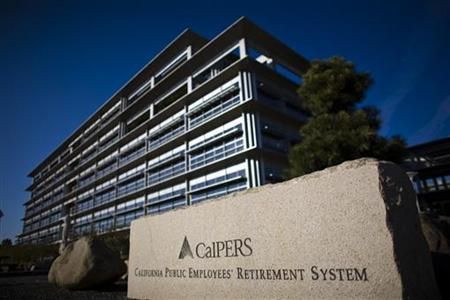California Pension Won't Force Wall Street To Disclose All Fees Charged To Retirees

Earlier this month, the nation’s largest public pension fund roiled the financial world: Officials overseeing $300 billion of California public employees’ retirement savings disclosed that the fund had paid $3.4 billion in fees to private equity firms over the last two decades. The news of the fees -- and a call by California Treasurer John Chiang for legislation requiring more ongoing disclosure -- seemed to herald a new trend toward greater transparency at a time when the Securities and Exchange Commission has warned that private equity investors may be getting hit hard by hidden fees.
That momentum toward transparency at the California Public Employees' Retirement System (CalPERS), however, appeared to abruptly halt last week when pension overseers quietly rejected a measure that would have required Wall Street firms to disclose all possible levies before they get their hands on the retirement savings of the system's 1.7 million members. Some CalPERS board members said they were concerned the measure might alienate private equity firms, thereby denying pensioners the benefits of those investments.
The initiative, introduced on December 14 by CalPERS board member J.J. Jelincic, would have blocked the pension fund from signing any new deals with private equity firms that do not disclose “any and all types of types of fees, carry, discounts, rebates and/or any other forms of economic rent” charged to investors. The move came after Jelincic compelled a top CalPERS official to publicly admit that the state does not know the total amount in fees pensioners are now paying to firms in its $28 billion private equity portfolio.
“All this amendment does is say, before we enter an agreement, you have to tell us what kind of fees you’re going to charge us,” Jelincic said, explaining the proposal. “It doesn’t limit how much you charge us. It doesn’t limit how we negotiate fee sharing. It only says you have to tell us what kind of fees you are charging.”
His fellow pension overseers said they also want to see more transparency -- but quashed the motion. Jelincic could not get even a single board member, including Treasurer Chiang’s own representative, to second his motion and allow it to come to a vote.
Susan Webber, a former Wall Street professional who runs the website Naked Capitalism under the pseudonym Yves Smith, condemned the board’s action as an abdication of their most basic obligations.
"Pension trustees' duty includes assessing the reasonableness of fees,” said Webber, whose site has aggressively covered CalPERS. “The board's insistence that they need to remain ignorant is a flagrant violation of their responsibility."
CalPERS spokesperson Joe DeAnda disagreed.
“CalPERS’ private equity program requires industry-leading disclosure and we continue to work for standardized disclosure across the industry,” DeAnda told International Business Times in an emailed statement. “The CalPERS Board and staff believe it is premature to add language that has not been fully vetted to our policy.”
In an emailed statement to IBT, Chiang asserted that the board did not have enough time to examine the initiative.
“My representative did not vote for the motion because neither the board nor staff were provided with adequate opportunity to review and analyze the language in advance," said Chiang, who reiterated that he will push for a fee transparency bill in the state legislature. "Without a deeper dive into the proposal -- including potential unintended consequences disadvantaging CalPERS as a private equity investor -- we were denied the opportunity make an informed decision."
Jelincic's language had first been discussed at a CalPERS board meeting in November and the CalPERS staff said in its agenda that it was prepared to discuss fee disclosure initiatives at the December meeting.
In recent years, the Securities and Exchange Commission (SEC) has sounded the alarm about hidden fees charged by private equity firms. An agency review last year of 400 private equity firms found a majority of them had charged unnecessary and undisclosed fees. But in assessing Jelincic’s measure, CalPERS board members cautioned that added disclosure requirements might drive off some private equity firms.
“I don’t think there’s anyone on this board that is not in favor of full fee disclosure,” said Bill Slaton, a local Sacramento utility director appointed to the pension board by Democratic Gov. Jerry Brown. But, Slaton said, “there may be some partners that we would like to do business with irrespective of this fee issue and that we would preclude those transactions from taking place in the short term.”
Dana Hollinger, another Brown appointee, seconded that concern. Requiring firms to disclose all the fees they’ll charge could "make it so restrictive to deal with us that we lose this asset class in our portfolio,” she said.
Jelincic countered: “I have to question why we would want to enter into any agreement with somebody who says, ‘I’m reserving the right to charge you fees that I’m not going to tell you about.’”
CalPERS’ outside consultant -- which advises the pension fund on how to invest -- recommended the board oppose the fee disclosure proposal because it might overwhelm the board with too much information about how much the pension system is paying in fees.
“If the question is tell us all of the fees that you will charge us -- or may charge us -- my fear is that you’re going to get back a laundry list of every single private equity fee possible, and it becomes meaningless," said Andrew Junkin, a managing director at Wilshire Associates.
At the hearing, CalPERS’ chief investment officer, Ted Eliopoulos, urged the board to wait at least a year before considering another fee disclosure proposal like Jelincic’s. Some other pension funds aren't waiting: following revelations of rising fees, officials in Rhode Island and New Jersey have pledged to take steps to increase transparency. Meanwhile, earlier this month, the leading pension trade publication, Pensions & Investments, published a house editorial demanding more fee disclosure.
© Copyright IBTimes 2024. All rights reserved.






















